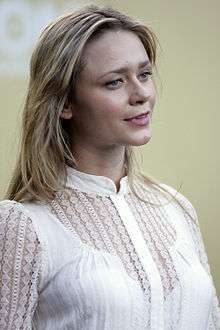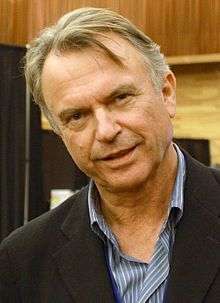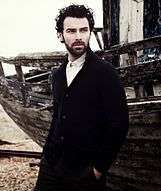And Then There Were None (miniseries)
| And Then There Were None | |
|---|---|
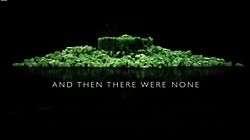 | |
| Genre | |
| Based on |
And Then There Were None by Agatha Christie |
| Written by | Sarah Phelps |
| Directed by | Craig Viveiros |
| Starring | |
| Composer(s) | Stuart Earl |
| Country of origin | United Kingdom |
| Original language(s) | English |
| No. of series | 1 |
| No. of episodes | 3 |
| Production | |
| Executive producer(s) |
|
| Producer(s) | Abi Bach |
| Cinematography | John Pardue |
| Running time | 180 minutes |
| Production company(s) |
|
| Distributor | BBC |
| Release | |
| Original network | |
| Picture format | HDTV 1080i |
| Audio format | Stereo |
| Original release | 26 December – 28 December 2015 |
| External links | |
| Website | |
And Then There Were None is a 2015 British-American mystery drama thriller television serial that was first broadcast on BBC One from 26 to 28 December 2015. The three-part programme was adapted by Sarah Phelps and directed by Craig Viveiros and is based on Agatha Christie's novel of the same name.[1][2][3] The serial aired in the United States on Lifetime from 13 to 14 March 2016.
Plot
On a hot day in late August 1939, eight people, all strangers to each other, are invited to a small, isolated island off the coast of Devon, England, by a "Mr and Mrs Owen". The guests settle in at a mansion tended by two newly hired servants, Thomas and Ethel Rogers, but their hosts are absent. When the guests sit down to dinner, they notice the centrepiece, ten figurines of soldiers arranged in a circle. Afterward, Thomas Rogers puts on a gramophone record, from which a voice accuses everyone present of murder.[4] Shortly after this, one of the party dies from poisoning, and then more and more people are murdered, all in methods synonymous with a nursery rhyme the island is named after,[5] and the murderer removes a figurine from the dining table each time someone is killed. The remaining people decide to work together. They must discover who the murderer is before they run out of time and nobody remains.
Cast
- Douglas Booth as Anthony Marston: Accused of killing two children, John and Lucy Coombes, by reckless driving, which he acknowledges.
- Charles Dance as Justice Lawrence Wargrave: Accused of murdering an innocent man by sentencing him to hang.
- Maeve Dermody as Vera Claythorne: Accused of murdering Cyril Hamilton, a boy in her care, having encouraged the child to swim out further in the hope that he would drown so her lover, the boy's uncle, would become heir to the family estate.
- Burn Gorman as Detective Sergeant William Blore: Accused of murdering a homosexual in a police cell.
- Noah Taylor and Anna Maxwell Martin as Thomas and Ethel Rogers: Accused of murdering a previous employer.
- Sam Neill as General John MacArthur: Accused of murdering a fellow officer having an affair with his wife.
- Miranda Richardson as Emily Brent: Accused of being responsible for the suicide of her maid by abandoning her when she became pregnant.
- Aidan Turner as Philip Lombard: Accused for killing 21 men in Eastern Africa for diamonds.
- Toby Stephens as Doctor Edward Armstrong: Accused of killing a patient during surgery while drunk.
Supporting cast
- Harley Gallacher as Cyril Ogilvie Hamilton
- Paul Chahidi as Isaac Morris
- Charlie Russell as Audrey
- Richard Hansell as Recording Artist (voice on gramophone)
- Christopher Hatherall as Fred Narracott
- Ben Deery as Henry Richmond
- Margot Edwards as Miss Brady
- Rob Heaps as Hugo
- Celia Henebury as Leslie MacArthur (voice only)
- Tom Clegg as Landor
- Daisy Waterstone as Beatrice
- Catherine Bailey as Olivia Ogilvie Hamilton
- Joseph Prowen as Edward Seton
Differences from the original novel
- In the book, the entire group are ferried by Fred Narracott together, except for Dr. Armstrong, who arrives later and is ferried separately. Here, Emily Brent and Anthony Marston are ferried early. Also Marston was not depicted as a cocaine addict in the book.
- Edward Seton, the man Justice Wargrave is accused of having hanged for crimes he did not commit (but was in fact guilty), was, in the original novel, executed for the murder of his landlady to get her money, but here is said by Wargrave to have killed multiple people, believing he was doing the world a favour by getting rid of them.
- In the book, Detective Sergeant William Blore is accused of having committed perjury, with the result that a man was wrongly sent to jail for life, where he died. In this series, Blore is accused of beating a homosexual man to death. In the book, he is killed by a clock in the shape of a bear being dropped on his head, whereas in this production he is killed by being stabbed and draped with a bear rug.[6]
- In the book, Emily Brent is killed with Dr Armstrong's hypodermic needle, and a bee put into the room to fulfill the rhyme. Here, after being given a sedative in her coffee, she is stabbed in the throat with one of her own knitting needles, embossed with her initials "EB", which, facing downward, sounds phonetically like "bee". Another variation is that in the original version, Brent's maid Beatrice Taylor had killed herself by drowning, not by throwing herself in front of a speeding train.
- In the book, the Rogers are suspected of having withheld vital medication from their elderly employer, Miss Brady, so as to kill her, whereas in the series they suffocate her with a pillow. Mrs Rogers receives a fatal overdose of chloral hydrate in her brandy in the drawing room in the chaos after the gramophone recording, whereas here it is implied that she was administered the overdose in her bedroom. Mr Rogers is killed with an axe to the head in the book, but here his midriff is eviscerated by the axe.
- In the book, General MacArthur has his wife's army officer lover, Henry Richmond, killed by sending out on a particularly deadly mission, where his death was almost assured. However, in this production General MacArthur shoots Richmond in the back. MacArthur is killed with a telescope here, whereas in the original novel he was bludgeoned by an unidentified weapon, suspected to be, ironically, a life preserver.
- In the book, Philip Lombard is responsible for the deaths of 21 men in East Africa by abandoning them in the desert and taking the food and supplies with him, which he does not deny. In this series, he kills the men to get diamonds.
- The bacchanal that takes place in the third episode does not happen in the book.
- In the book, there is no explicit romance between Vera and Lombard and they never become physically intimate with one another.
- In the book, Vera hangs herself in a post-hypnotic trance after shooting Lombard dead, and never discovers the true identity of "U.N. Owen", and the reader only finds out in the postscript that Owen was Wargrave.[7] In this production, Wargrave walks into the room while Vera is about to hang herself, explains his actions and motivations, and informs her that he intends to shoot himself and create an unsolvable mystery. She tries to bargain with him but he suddenly yanks the chair from under her feet, causing her seemingly self-inflicted death.
- Wargrave's death is very different from the novel. In the book, he sets up his death in his bedroom to reflect how he was last found, by shooting himself in the forehead, with a cord tied to the revolver and door knob, allowing the gun to be pulled away after firing. Here, after killing Vera, he goes to the dining room, where he sets up two place settings, presumably for himself and "U.N. Owen". He fires the bullet just under his chin, and the revolver's recoil propels the gun away, landing at the empty place setting.
- In the novel, after the deaths and the arrival of help from the mainland, two policemen sit to discuss the case and ultimately are unable to solve the mystery. Later, a note from the murderer in a bottle is caught in a fishing trawler's net and the mystery is solved. Neither occurs in this version.
Production
Conception
And Then There Were None was commissioned by Ben Stephenson and Charlotte Moore for the BBC to mark the 125th anniversary of Agatha Christie's birth.[8] The adaptation was produced by Mammoth Screen in partnership with Agatha Christie Productions.[9][10][11]
Writer Sarah Phelps told the BBC that she was shocked by the starkness and brutality of the novel. Comparing the novel to Christie's other work, she stated, "Within the Marple and Poirot stories somebody is there to unravel the mystery, and that gives you a sense of safety and security, of predicting what is going to happen next... In this book that doesn't happen – no one is going to come to save you, absolutely nobody is coming to help or rescue or interpret".[12]
Casting
Maeve Dermody was cast two days before the read through of the script and was in Burma (Myanmar) at the time.[13] She flew to the UK to begin work with a dialect coach and read the book in the first two weeks of filming.[14]
Filming
Filming began in July 2015.[15] Cornwall was used for many of the harbour and beach scenes, including Holywell Bay, Kynance Cove, and Mullion Cove.[16] Harefield House in Hillingdon, outside London, served as the location for the island mansion.[17] Production designer Sophie Beccher decorated the house in the style of 1930s designers like Syrie Maugham and Elsie de Wolfe.[18] Railway scenes were filmed at the South Devon Railway between Totnes and Buckfastleigh.[19]
Episodes
| No. | Title | Directed by | Written by | Original air date | UK viewers (millions) |
|---|---|---|---|---|---|
| 1 | "Episode 1" | Craig Viveiros | Sarah Phelps | 26 December 2015 | 9.56[20][lower-alpha 1] |
| On a hot late August day sometime in the late 1930s, eight strangers arrive at Soldier Island, most having ostensibly been invited by old friends or the current ostensible owners, Mr and Mrs Owen, a married couple. There is no host to greet them but there are domestic staff, Thomas and Ethel Rogers, a married couple. The "guests" find a copy of a children's rhyme "Ten Little Soldiers" in each of their rooms and ten miniature jade figures of soldiers on the dining room table. After dinner, Mr Rogers, who had been instructed to do so, plays a gramophone record, in which all the guests as well as Mr and Mrs Rogers, are named as being responsible for the death(s) of another human being (or other human beings) for which they evaded punishment. One of the guests (Blore) is revealed to be an impostor using another name. Each guest refutes the accusations made against them – except for two; Philip Lombard and Anthony Marston, the latter of whom dies shortly thereafter from cyanide-laced gin in a similar manner of the first little soldier. The next day, the cook Mrs Rogers is found dead in her bed from unknown causes (although Dr Armstrong diagnoses an overdose of some barbiturate), matching the second verse from the poem. Vera Claythorne shows Dr Armstrong that two of the soldiers in the dining room have disappeared. | |||||
| 2 | "Episode 2" | Craig Viveiros | Sarah Phelps | 27 December 2015 | 8.45[20][lower-alpha 1] |
| The poisoning of both victims casts suspicion on Dr. Armstrong who has his bag searched. As a hunt for the mysterious Mr Owen is conducted on the island, the nature behind the accusations begin to come to light; Philip Lombard confirms that he killed 21 Africans for a diamond reward, Emily Brent recounts the fateful past of her former maid, Beatrice Taylor, and General MacArthur succumbs to insanity, crippled with guilt over killing his subordinate and wife's lover, Arthur Richmond. After the General is found with his head smashed in with a telescope, the remaining seven realise that whoever left the mysterious message intends to make good on their threat, according to the rules of the nursery rhyme. Wargrave proposes a damning theory to the others that the killer is one of them. After the butler, Mr Rogers, is found split open with an axe, and Miss Brent is impaled with one of her knitting needles, the five survivors band together to search all the rooms and belongings to unmask the killer and save themselves. | |||||
| 3 | "Episode 3" | Craig Viveiros | Sarah Phelps | 28 December 2015 | 8.33[20][lower-alpha 1] |
| Five of the original ten are left. During a moment of confusion, Judge Wargrave is found with an apparent gunshot wound to the head and declared dead by Dr Armstrong. The judge has been dressed up to match the Chancery verse of the poem. The remaining four engage in a demented bacchanal with alcohol and drugs. During the night, the doctor leaves the house, leaving the other three to believe he is the killer. An attempt for rescue is initiated, but Blore is ambushed by the killer wearing a bear skin rug, and is fatally stabbed. Subsequently, Dr Armstrong's corpse is brought in by the tide, leaving only Philip and Vera alive. Vera manages to trick Lombard and lifts his gun. When he charges at her, she shoots him dead. Delirious, she returns to her room where a noose is waiting. In a trance, she begins to hang herself. Then, Judge Wargrave walks in, quite alive, and reveals how he wanted to create an unsolvable mystery and punish the guilty, and how he intends to shoot himself to complete the poem. Vera tries to bargain with Wargrave but he pulls the chair from under her and leaves her to die. He returns to the dining room, where he has set the table for two. He loads the revolver with the final bullet and shoots himself. The revolver recoils to land at the other table setting, thus creating a presumably unsolvable mystery for the police, as Wargrave had always planned to do. | |||||
Reception
And Then There Were None received critical acclaim and was a ratings success for the BBC, with the first episode netting over 6 million viewers and becoming the second most watched programme on Boxing Day. Each of the two subsequent episodes netted over 5 million viewers.[21]
Despite criticism ahead of the programme's launch from the Daily Mail that the production deviated from Agatha Christie's source material,[22] And Then There Were None received critical acclaim. Ben Dowell of the Radio Times gave a positive review.[23] Jasper Reese for The Daily Telegraph gave the first episode 4 out of 5 stars, calling it a "pitch-black psychological thriller as teasing murder mystery" and "spiffingly watchable".[24]
Reviewing the first episode, UK daily newspaper The Guardian's Sam Wollaston noted, "[...] it also manages to be loyal, not just in plot but in spirit as well. I think the queen of crime would approve. I certainly do. Mass murder rarely gets as fun as this."[25] Reviewing the final episode for The Daily Telegraph, Tim Martin gave it 4 out of 5 stars, calling it a "class act", and praising the adaptation for highlighting the darkness of Christie's novel, which he claimed no previous adaptation had attempted.[26]
See also
Notes
References
- ↑ Plunkett, John (28 February 2014). "David Walliams to star as BBC bags Agatha Christie drama deal". The Guardian. Retrieved 3 April 2014.
- ↑ Dowell, Ben (28 February 2014). "David Walliams heralds new era for BBC as the new home of Agatha Christie adaptations". Radio Times. Retrieved 3 April 2014.
- ↑ "David Walliams to star in new Agatha Christie BBC drama". Independent. 28 February 2014. Retrieved 3 April 2014.
- ↑ "Filming begins on Agatha Christie's And Then There Were None". agathachristie.com. Retrieved 24 December 2015.
- ↑ "And Then There Were None What's Up With the Epigraph?". Shmoop.com. Retrieved 29 February 2016.
- ↑ "And Then There Were None Plot Analysis". Shmoop.com. Retrieved 29 February 2016.
- ↑ "And Then There Were None What's Up With the Ending?". Shmoop.com. Retrieved 29 February 2016.
- ↑ "BBC One to become new home of Agatha Christie in UK". BBC. 28 February 2014. Retrieved 3 April 2014.
- ↑ Kemp, Stuart (27 February 2014). "BBC Commissions Two New Agatha Christie Adaptations". Hollywood Reporter. Retrieved 3 April 2014.
- ↑ Barraclough, Leo (28 February 2014). "BBC Plots Agatha Christie Adaptations for Writer's 125th Anniversary". Variety. Retrieved 3 April 2014.
- ↑ Kanter, Jake (28 February 2014). "BBC signs Agatha Christie deal". Broadcast. Retrieved 3 April 2014.
- ↑ Staff (17 December 2015). "Adapting Agatha Christie's 'And Then There Were None' for BBC One". BBC Online. Retrieved 27 December 2015.
- ↑ Dermody, Maeve. "Maeve Dermody plays Vera Claythorne". Agatha Christie.com. Retrieved 29 December 2015.
- ↑ Dermody, Maeve. "Behind the scenes". Agatha Christie.com. Retrieved 29 December 2015.
- ↑ "Filming begins on Agatha Christie's And Then There Were None for BBC One". BBC. 10 July 2015. Retrieved 27 December 2015.
- ↑ "Not Poldark: Aidan Turner back in Cornwall with Charles Dance and Sam Neill in Agatha Christie drama". West Briton. 22 July 2015. Retrieved 27 December 2015.
- ↑ Tom Deehan (22 December 2015). "BBC's And Then There Were None filmed in Cornwall and Hillingdon". The Location Guide. Retrieved 27 December 2015.
- ↑ "And Then There Were None: A Landmark Adaptation of the World's Best SElling Crime Novel" (PDF) (Press release). BBC. December 2015. Retrieved 27 December 2015.
- ↑ "Steam railway is a star in Christie's ratings winner". Western Morning News. 8 January 2016. Retrieved 29 February 2016.
- 1 2 3 "Top 30 Programmes". BARB. 14 February 2016. Retrieved 29 February 2016.
- ↑ Jackson, Jasper (29 December 2015). "And Then There Were None helps BBC dominate Christmas ratings". Retrieved 29 December 2015.
- ↑ Hastings, Chris (12 December 2015). "What HAS the BBC done to Agatha Christie? Christmas viewers will be stunned by controversial new adaption featuring drugs, gruesome violence and the F-word". Daily Mail. Retrieved 29 December 2015.
- ↑ Dowell, Ben (26 December 2015). "And Then There Were None is a creepy, chilling Agatha Christie... with a helping of Aidan Turner". Radio Times. London. Retrieved 28 December 2015.
- ↑ Rees, Jasper (26 December 2015). "And Then There Were None, review: 'spiffingly watchable'". The Daily Telegraph. London. Retrieved 26 December 2015.
- ↑ Wollaston, Sam (26 December 2015). "Dickensian review – a labour of love obscured by too much fog and too many hats". The Guardian. London, UK. Retrieved 29 December 2015.
- ↑ Martin, Tim (28 December 2015). "And Then There Were None, episode three, review: 'a class act'". The Daily Telegraph. London, UK. Retrieved 29 February 2016.

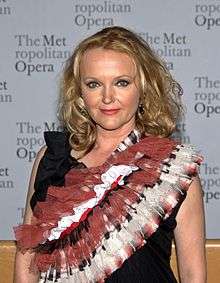
.jpg)
